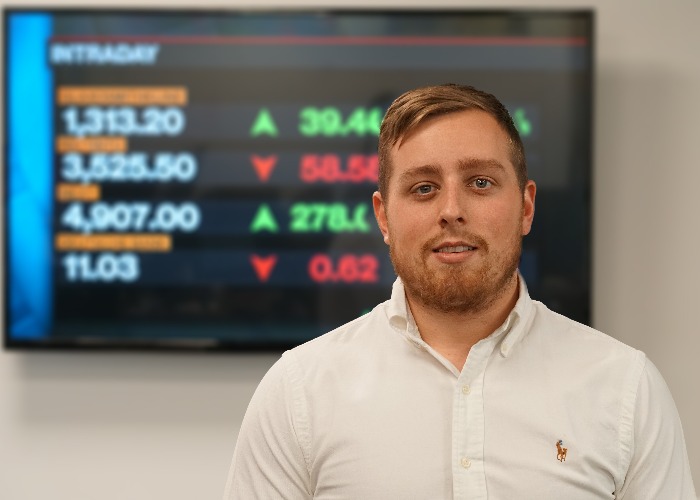'I turned my passion for investing into a successful trading business'

Sam Leach went from trading stocks in university halls to making millions teaching others how to trade.
It’s fair to say that Sam Leach has had a few hurdles to clear in becoming the successful business owner he is today.
He's the founder of Samuel & Co, an FCA-accredited trading training business that teaches young people how to trade stocks and foreign currencies, helping them get a foot in the door in a hugely competitive area of finance.
It now has headquarters in Watford and Madrid, dozens of staff, and turned over more than £2 million this year alone.
Not bad given Sam was expelled from school, and spent much of his teen years in a bedsit, sharing a room with his dad and brother.
If you're new to investing, have a read of our top 10 tips to getting started.
Getting the trading bug
Sam’s interest in trading had started while still living at home, and he used all of his savings ‒ as well as some money borrowed from his parents ‒ to sign up for a forex course.
However, he was stung by the experience.
“What they taught us, it was not a lot more than I could have learned from using Google. It hit me like a brick that I’d spent £3,000 on two days, and I didn't feel I gained anything from it.”
Betting the bursary
Despite this, he threw himself into trading at home, spending up to 18 hours a day on paper trades, before heading off to university and devoting his £2,000 bursary to real trades.
It was undoubtedly a huge risk, but it began to pay off in ways he'd not expected.
While living in the university’s halls of residence, his trading caught the eye of his fellow students, who offered him money to teach them what he was doing.
According to Sam, he raked in a whopping £6,000 in fees, and the seeds for what would eventually become Samuel & Co were planted.
We attended a day trading course to see what we could learn
Giving up the day job
By his final year at university Sam was combining his studies with working three days a week at the private bank C Hoare & Co, and spending his evenings and weekends attempting to get his trading business off the ground.
Something had to give, and he ended up being hospitalised due to stress.
“I had to start focusing on what I really wanted to do.
"I was making more money from the trading than the bank, so I decided to leave this lovely, secure private bank ‒ it was a great place, but I had to make that decision.”
5 ways to spot a forex trading scam
High-risk strategy
By 2015, Sam elected to take another risk, self-funding the opening of his own office and trading floor.
“That was when it got really serious, risking all that money I could be trading to go and get an office. I started out with five staff, paying them on contract and commission, and after a couple of months hit a crunch point ‒ if I didn’t start making this work, I’d be out of money.”
Sam ended up sleeping at the office, spending all of his time on analysis, working out what would be the biggest moving stocks.
With money so tight, he had to ask a lot of his colleagues, too.
“At one point I remember having to ask staff if they would work for free for a month, just get their commission. Two left but the rest stayed, and they are still here, with a team of over 80 traders.”
Giving something back
Sam admits that he went through a phase of “fast cars and luxury”, but as he has got older he has wanted his business to “be a bit more socially responsible”.
This has included setting up the Overwatch charity, aimed at helping the fight against plastic pollution.
Sam has a host of top fashion designers on board to launch a designer fashion range, with every penny going towards the charity.
He is also talking to schools in Hertfordshire with the aim of helping improve financial education.
Capital at risk
Adapting is key
Sam says that one of the biggest lessons he has picked up from running his business is that nothing is ever going to go quite to plan.
“I see myself as a firefighter, there’s always something to put out in order to move forwards.
"It’s easy to get disheartened when things don’t quite play out as planned, but it’s good to see it as constructive. You can use it to make changes to take the business forward.”
The pace of the firm’s growth has also thrown up its own challenges.
He notes that he has put processes in place to give staff a voice and ensure they get to speak to him and the rest of senior management, as they may not have actually met him during the recruitment process.
“You have to realise that you won’t be the driver of every department after a while.
"But just letting go is empowering to the staff ‒ if you don’t let go, it restricts their chances of growth.”
If you're new to investing, have a read of our top 10 tips to getting started.
Setting up your own business
If you have dreams of going it alone, we have a load of helpful guides to get you started:
Comments
Be the first to comment
Do you want to comment on this article? You need to be signed in for this feature
